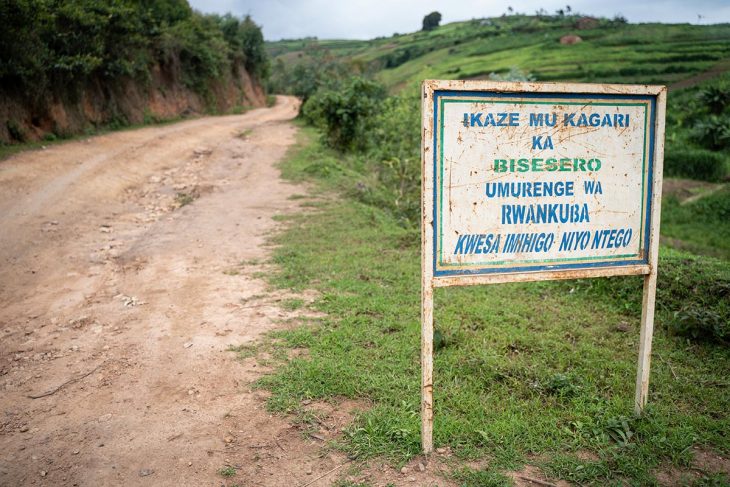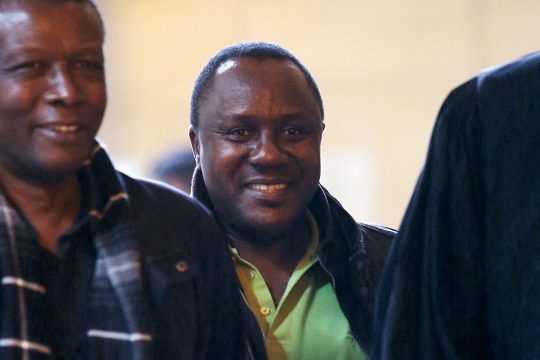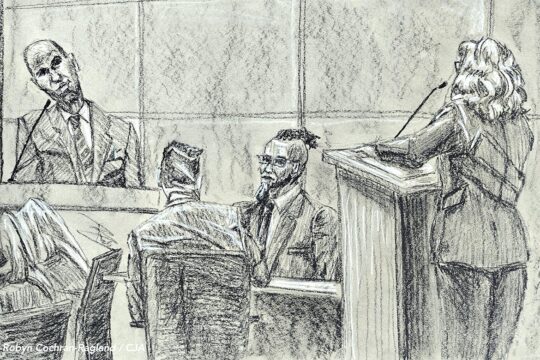How did the driver of a small hotel find himself before a French court being tried for genocide perpetrated in Rwanda in 1994? Claude Muhayimana, a 60-year-old Franco-Rwandan, was tried before the Assize Court of Paris from November 22 to December 16, 2021. The trial was held under the principle of universal jurisdiction, which allows certain countries to try international crimes committed outside their territory, including by non-nationals. Muhayimana was charged with complicity in genocide and complicity in crimes against humanity. He was not accused of being a main perpetrator of the crime, but French law considers perpetrator and accomplice on an equal footing, the prosecutor explained during her closing arguments on December 15.
This is the third trial held in France related to the genocide of the Tutsis in Rwanda, but the previous two trials targeted military officials or civilian authorities. Muhayimana was at the time "just a driver", according to the defence. His lawyer Philippe Meilhac says the accused "found himself in the middle of chaos, (...) in the particular context of Kibuye", a town in western Rwanda which was the location of the small hotel for which Muhayimana worked as a driver. To be placed in the midst of chaos meant, according to the defence, being requisitioned on pain of death to drive gendarmes busy massacring Tutsis who had taken refuge in the hills of Gitwa, Karongi and Bisesero, in the heart of the mountainous chain that overlooks the Kibuye region. For the prosecution, it was precisely here that the role of a driver became important in the execution of the genocide.
Mobility, a key element in the genocide
The soldiers and militiamen needed to be mobile to go and kill their Tutsi compatriots taking refuge in the mountains, explains historian Hélène Dumas, who was called as an expert witness in this trial. This mobility, she believes, was an important factor in Rwanda’s steep terrain. In what she calls the "massification of the genocide," different categories of the Hutu population were mobilized to participate in the massacres. Some of the places of refuge for hunted Tutsis were hard to reach, because of rain-damaged dirt roads and the distance on foot. Vehicles were needed, and not just any vehicles. Buses and vans were requisitioned to move Interahamwe militiamen (youth wing of the party in power in 1994), police, gendarmes, soldiers and prison guards, all armed to go and attack the Tutsis.
Eric Gillet, president of the Belgian NGO RCN Justice & Democracy, which was created in Rwanda after the genocide, told the court that in Rwanda in the 1990s, cars belonged mainly to big businessmen, religious people and public institutions. For him, "driving a car was not something that went unnoticed in this country”.
Muhayimana was a driver at the Guest House in Kibuye, a hotel run by the Rwandan Office of Tourism and National Parks, a public institution. This position made him a well-known person in the small town of Kibuye, where he was born. Some witnesses reported seeing his vehicle in a particular location, without necessarily specifying whether it was driven by him, as the small number of vehicles meant they were associated with the name of the driver.
Every link in the chain of crime counts
When the court asked this "simple driver" if he knew whether the genocide of the Tutsis had been planned, the accused said he knew that Tutsis had been killed, but that he could not have known about the planning of this genocide. But the lawyers for the civil parties rejected the idea that he was just a driver, driving a vehicle full of armed people on their way to commit genocide.
According to the lawyer for the civil parties, Richard Gisagara, this is "a defence version of what happened that suggests this is a minor trial". But, he told Justice Info, "any genocide trial is, in essence, an important case”. He points out that the genocide was carried out at several levels, and that is what allowed it to take place. "I consider that all the links in the chain that led to the genocide are important. I am approaching this case in the same way as the case of Pascal Simbikangwa and the former mayors of Kabarondo, and it is as important as the others," he added, referring to the two other Rwandan genocide trials that have been held in France.
"In a genocide, there are no big and small fish," said Alain Gauthier, president of the Collectif des parties civiles pour le Rwanda, a French association that tracks genocide suspects who fled abroad. "There are those who organized [the genocide] at the level of the Rwandan state, but all those who participated, in one way or another, must be judged in the same way."
The shadow of the French military
Muhayimana's trial relates to acts committed in the Bisesero mountains, which has painful memories for relations between France and Rwanda. The massacres were still going on when the French military arrived in the region at the end of June 1994, as part of Operation Turquoise, and the French army was accused of not providing immediate assistance to the hunted Tutsis who were still alive, leaving some of them in the hands of the killers. The former commander of the Turquoise regiment in Bisesero, retired general Patrice Sartre, was called as a witness under the discretionary power of the trial court’s presiding judge. In his testimony, Sartre told the court that the French mission was initially humanitarian and they had information that a civil war was going on in Rwanda. "But when we got there, we found that the Hutus were massacring the Tutsis," he said. Survivors of the massacres testified at the trial that there was an encounter with the French military, who asked them to come out of their hiding places before leaving, allowing the killers to spot and attack them. "After three days, the French military came back and we showed them the bodies of freshly massacred Tutsis and they were shocked," said Aaron Kabogora on November 29.
In order to seek political asylum in France in 2004 and avoid extradition to Rwanda, Muhayimana (who arrived in France in 2001) claimed he had served as a guide to the French military. Heclaimed that the Rwandan government had tried to get him to sign a document accusing the French military of having raped Tutsi women refugees in Bisesero, which he refused to do. Muhayimana wrote twice to General Sartre asking for assistance. André-Martin Karongozi, another lawyer for the civil parties, believes the accused put forward this claim of pressure from the Rwandan authorities to help him get political asylum and then French nationality.
Finally, on December 16, the Paris Court of Assizes ruled that Muhayimana was guilty of the charges against him. For his complicity in the crime, for having served as a driver to the militia, he was sentenced to 14 years in prison.







